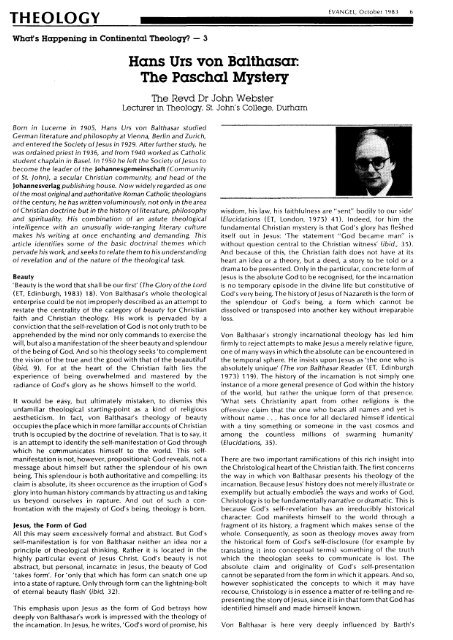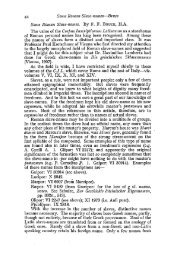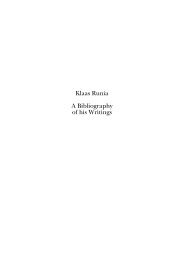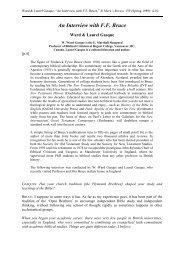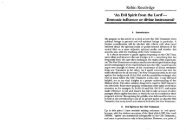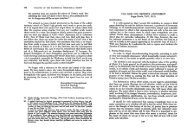Hans Urs von Balthasar: The Paschal Mystery - TheologicalStudies ...
Hans Urs von Balthasar: The Paschal Mystery - TheologicalStudies ...
Hans Urs von Balthasar: The Paschal Mystery - TheologicalStudies ...
Create successful ePaper yourself
Turn your PDF publications into a flip-book with our unique Google optimized e-Paper software.
THEOLOGY<br />
presentation of Christological material in the later volumes of<br />
the Church Dogmatics. From his time as a student chaplain in<br />
Basel onwards, <strong>von</strong> <strong>Balthasar</strong> has been a very shrewd and<br />
profound interpreter of Barth's work, and his study <strong>The</strong><br />
<strong>The</strong>ology of Karl Barth (ET, New York, 1971) remains one of the<br />
most perceptive pieces of writing on Barth, Protestant or<br />
Catholic. Above all else, what he has taken from Barth is a sense<br />
that it is im permissible forthe theologian to seek to' go behind'<br />
the form in which God has revealed himself: the 'truth' which<br />
God shows about himself is essentially inseparable from the<br />
manner of its occurrence. It is not without significance that <strong>von</strong><br />
<strong>Balthasar</strong> entitles his reflections on the event of God's dealings<br />
with the world in Jesus Christ a theodramatic.<br />
<strong>The</strong> second matter to be drawn out concerns the' catholicity' of<br />
<strong>von</strong> <strong>Balthasar</strong>'s theology. For all his insistence on the highly<br />
specific character of God's self-manifestation in Christ, he<br />
insists equally that this particularity does not disqualify or<br />
cancel out the rest of human history as insignificant. For Jesus<br />
Christ is not only the one who is absolutely unique: he is also<br />
the one in whom all things find their integrating focus. Out of<br />
the specific event of God's disclosure of himself there radiates a<br />
light which illuminates in a new way all cultural and religious<br />
phenomena. <strong>The</strong> Christian gospel 'sheds overthe whole a light<br />
which makes possible ... a new and deeper appreciation'<br />
(Elucidations, 36). This correlation of the broadest universality<br />
with the densest particularity has its origins in <strong>von</strong> <strong>Balthasar</strong>'s<br />
studies of the Eastern fathers, and in particular Origen, on<br />
whom he has written at length and with great insight. Out of<br />
such resources has come the impetus for <strong>von</strong> <strong>Balthasar</strong> to<br />
develop a theology which is integrative but not syncretistic,<br />
holding together the universal reach of God's glory with its<br />
particular form in the person of Jesus Christ.<br />
Incarnation and Trinity<br />
Von <strong>Balthasar</strong>'s theology of the incarnation leads to a particular<br />
manner of approaching the doctrine of God. Because Jesus<br />
'fleshes out' or 'bodies forth' the nature of God, his history<br />
furnishes the key to the inner relationships of the Trinity. <strong>The</strong><br />
drama of the incarnation, that is, plays out before the eyes of<br />
the world the loving unity between Father and Son in the bond<br />
of the Spirit. Thus it is truly the incarnation which lies atthe root<br />
of Christian belief about the differentiated character of God.<br />
<strong>The</strong> life of God is neither flat nor relation less: rather, it is fully<br />
sodetal, bearing within itself both the pain of separation and<br />
the mutuality of love.<br />
Such an understanding of God's trinitarian relatedness is<br />
narrated in th.e gospels, notably for <strong>von</strong> <strong>Balthasar</strong> in the motif of<br />
the obedience of the Son to the will of the Father which<br />
echoes through the Gospel of John. In this'absolute self-giving<br />
to the loving will of the Father' (Pneuma und Institution<br />
(Einsiedeln, 1974) 139), Jesus does not merely exemplify a<br />
perfect human spirit fully given over to doing the will of God.<br />
Much more are we to trace in his obedience the very ways of<br />
God himself. In such a fashion does the logic of belief in the<br />
incarnation lead ineluctably to belief in God as Trinity.<br />
Yet it does so in a strange way, following a strange path. For it is<br />
precisely in the abandonment of the Son to death on the cross<br />
that God's trinitarian nature is embodied - precisely, that is, in<br />
that event in which the unity of the divine life seems imperilled<br />
in the extreme. And it is only because Father and Son remaineven<br />
at the point of their furthest separation - bound together<br />
in the Holy Spirit that the divine life does not collapse into the<br />
void. For at the cross, God 'proves to be so living, so mobile,<br />
that he can reveal his life precisely even in death, his trinitarian<br />
communality even in abandonment' (ibid., 402). How does<br />
this happen?<br />
EVANGEL, October 1983 7<br />
''He who speaks of the incarnation speaks of the cross'<br />
(' Mysterium <strong>Paschal</strong>e' in J. Feiner, M. Lohrer, ed., Mysterium<br />
Salutis 111/2 (Einsiedeln, 1969) 142. At Golgotha, the incarnate<br />
Son fulfils his obedience to the will of the Father by submitting<br />
to having the sin of the whole world vent its rage on him. His<br />
submission is a submission to a powerlessness in which he is no<br />
longer in control of his fate, to a descent into the depths of<br />
Godforsakenness, as the cry of dereliction testifies. Of that cry,<br />
<strong>von</strong> <strong>Balthasar</strong> writes: '<strong>The</strong> fountain from which the Son lives<br />
eternally seem to be empty .... As the embodiment of sin he<br />
can no 10ngerfi(1d any support in God; he has identified himself<br />
with that which God must eternally turn away from himself'<br />
(Der dreifache Kranz (Einsiedeln, 1979) 45). And yet the divine<br />
life does not at this point break down; the distance between<br />
Father and Son at the cross is not a distance in which God is in<br />
opposition to himself. Rather, it is the manifestation of the<br />
mutuality of God's being, for here, too, there is played out 'the<br />
commitment of the divine persons to each other' so that 'the<br />
mystery of the cross is the highest revelation of the Trinity'<br />
(ibid.). <strong>The</strong> kenosis of the Son 'even to death on a cross' is at<br />
one and the same time the plerosis in which God is supremely<br />
himself.<br />
To believe that God is three-in-one is to believe that God is<br />
love. That is to say, belief in the Trinity is belief, not merely that<br />
God acts lovingly but that he is, in his inmost being, related in<br />
procession and mission: 'God is love in himself' (Elucidations,<br />
23). It is also to believe that God is our God, directed in all his<br />
ways towards mankind. For'he came to us in an event - which<br />
had its climax in Jesus Christ - of such self-giving, defenceless,<br />
inviting power (or powerlessness) that we understand at least<br />
so much; he wants to be for us' (ibid., 24). But how precisely is<br />
God 'for us'? That question points us to the heart of <strong>von</strong><br />
<strong>Balthasar</strong>'s understanding of the atonement.<br />
<strong>The</strong> fundamental category in <strong>von</strong><br />
<strong>Balthasar</strong>'s conception of the<br />
atonement is that of solidarity. In<br />
this he moves significantly beyond<br />
some of the more familiar classical<br />
models.<br />
<strong>The</strong> <strong>Mystery</strong> of Holy Saturday<br />
<strong>The</strong> fundamental category in <strong>von</strong> <strong>Balthasar</strong>'s conception of the<br />
atonement is that of solidarity. In this he moves significantly<br />
beyond some of the more familiar classical models - Anselm's<br />
'satisfaction' theory, the 'penal substitution' of the later<br />
Calvinist divines - although the roots of his thinking are<br />
arguably deep in the patristic writings. for him, the mystery of<br />
redemption is the demonstration in the death of Christ of<br />
God's solidarity with the sinner who seeks to estrange himself<br />
from God.<br />
To expand this theme, <strong>von</strong> <strong>Balthasar</strong> focusses not only on the<br />
events of Good Friday and Easter Day, but also on Christ's<br />
descent into hell on Holy Saturday. One of the strongest<br />
impulses to develop along this direction came from his close<br />
collaboration with Adrienne <strong>von</strong> Speyr, a doctor who was<br />
converted under him and who was the subject of mystical<br />
experiences of participation in the paschal sufferings of Christ.<br />
Von <strong>Balthasar</strong> later wrote of her that she' possessed in a special
THEOLOGY<br />
way a charism of theological insight. To the central insights<br />
bestowed on her belong the mysteries of Holy Saturday and<br />
hence of hell and universal redemption as well' (<strong>The</strong> <strong>von</strong><br />
<strong>Balthasar</strong> Reader, 403). From <strong>von</strong> Speyr's experiences and<br />
writings, <strong>von</strong> <strong>Balthasar</strong> has taken the motif of the descent into<br />
hell as expressing God's refusal to abandon those who<br />
abandon him. Because he shares hell with the sinner, the<br />
sinner's wilful attempt to live and die without God is forestalled.<br />
Even in hell, God himself is present in the Son. 'On holy<br />
Saturday there is the descent of the dead Jesus to hell, that is .. .<br />
his solidarity ... with those who have lost their way from God ... .<br />
In this finality (of death) the dead Son descends ... He is .. .<br />
dead together with them. And exactly in that way he disturbs<br />
the absolute loneliness striven for by the sinner: the sinner,<br />
who wants to be "damned" apart from God, finds God again in<br />
his loneliness, but God in the absolute weakness of love who ...<br />
enters into solidarity with those damning themselves' (Pneuma<br />
and Institution, 408f). However much the sinner may seek to<br />
put' himself beyond God in 'the complete loneliness of beingonly-for-oneself,<br />
God himself enters into this very loneliness as<br />
someone who is ever more lonely ... even what we call "hell"<br />
is, although it is the place of desolation, always still a<br />
christological place' (ibid., 444).<br />
REFLECTIONS<br />
Any adequate critical appraisal of <strong>von</strong> <strong>Balthasar</strong>'s theology<br />
would need to devote considerable attention to his sense of<br />
the universal scope of the Christian gospel. In particular, it<br />
would need to offer a careful account of the Christological<br />
basis of <strong>von</strong> <strong>Balthasar</strong>'s 'catholicism' or 'universalism'.<br />
'Universalism' is not infrequently pilloried by its orthodox<br />
opponents as the result of a kind of moral and doctrinal/aisseLfaire<br />
which skates lightly over those tracts of Christian teaching<br />
which speak of judgement and condemnation, and which<br />
imagines one fate to be enjoyed by all, irrespective of their<br />
decisions and desires. 1Jniversalism' of this kind, rarely a<br />
serious option and more often than not a popular fantasy, is<br />
quite alien to <strong>von</strong> <strong>Balthasar</strong>'s doctrine of the atonement. His<br />
own theology, if it is to be labelled 'universalist', is only so in a<br />
very specific (Christological) sense, namely in that it espouses<br />
the universal presence of God in Christ to all men, blessed and<br />
damned.<br />
Two lines of thought may be fruitful in seeking to appraise his<br />
work here. A first set of questions concerns the adequacy of the<br />
category of 'presence'. He maintains, as we have seen, that<br />
Christ's descent into hell on Holy Saturday is an assertion of the<br />
preseilce of God to those who have chosen to exclude<br />
themselves from that presence. It remains unclear, however, in<br />
precisely what ways the presence of God qualifies the situation<br />
of those in hell. That is so, chiefly because <strong>von</strong> <strong>Balthasar</strong>'s<br />
account gives no hint of the response of the damned to the<br />
presence of God in Christ: his presence does not evoke a<br />
mutual relationship. God as it were stands before or alongside<br />
the sinner, but not in such a way as to make him into a partner.<br />
Von <strong>Balthasar</strong> maintains this assertion of the silent, undemanding<br />
presence of God in order to retain the freedom of man. But its<br />
soteriological significance is considerably blunted by the lack<br />
of an element of mutuality and dialogue between God and<br />
man.<br />
A second set of questions centre around the emphasis on<br />
human freedom in <strong>von</strong> <strong>Balthasar</strong>'s account. One of the chief<br />
motives of his <strong>The</strong>ology of Holy Saturday is the desire to retain a<br />
sense of the universal scope of Christ's redemptive love<br />
EVANGEL, October 1983 8<br />
without compromising the freedom of man. He sees quite<br />
clearly that one of the gravest weaknesses of universal ism may<br />
be its incompatibility with human freedom: no man is in the<br />
end free to reject God. Von <strong>Balthasar</strong> seeks to hold on to what<br />
he sees as the truth of universalism (the 'catholic' scope of<br />
God's love) without robbing man of freedom to choose his<br />
destiny. God comes 'over to our side in order to open a way for<br />
us from within our helplessness and hopelessness - yet<br />
without in any way over-trumping that situation with his<br />
omnipotence, that is, impugning our freedom in any manner'<br />
(Elucidations, 40). Now it is precisely in order to retain man's<br />
freedom that <strong>von</strong> <strong>Balthasar</strong> develops the notion of God as simply<br />
present to the sinner without evoking any response - if the<br />
sinner were to respond, his free decision to cut himself off<br />
absolutely from God would be impugned. But to propose this is<br />
to raise questions concerning the effectiveness of God's loving<br />
presence. Indeed, it may well be that <strong>von</strong> <strong>Balthasar</strong>'s desire to<br />
do justice to man's freedom cannot cohere with his sense of<br />
the universality of God's loving presence, unless that presence<br />
be made less than effectual.<br />
Questions in this area have, of course, furnished some of the<br />
most characteristic perplexities of the Christian theological<br />
tradition, perplexities which remain largely unresolved. But<br />
what can perhaps be most fruitfully taken from his work is not<br />
so much a set of doctrinal positions as an example of the<br />
integration of theological reflection with the life of faith. <strong>The</strong><br />
Dominican theologian Cornelius Ernst once remarked that<br />
theology is, properly understood, 'engaged contemplation'<br />
(Multiple Echo (London, 1979) 151). Part of the persuasiveness of<br />
<strong>von</strong> <strong>Balthasar</strong>'s theological writing lies in the fact that it is not<br />
primarily critical but contemplative. To describe his work in<br />
these terms is not to suggest that it is the fruit of private<br />
mystical experience rather than the public self-manifestation<br />
of Cod; nor is it to envisage the theologian's task as necessitating<br />
withdrawal. What is meant is rather that as contemplative<br />
theology it is born of a fundamentally receptive attitude of<br />
spirit and mind towards Cod's self-disclosure. Its origin is not<br />
critical inquiry but rapture; its most characteristic attitude is<br />
that of being utterly overwhelmed by the splendour of Cod. It<br />
is for these reasons that there is for <strong>von</strong> <strong>Balthasar</strong> the closest<br />
possible correlation between theological reflection and the life<br />
of prayer, and that he has called for more' kneeling theologians'<br />
(Verbum Caro (Einsiedeln, 1960) 224). If orthodox theology is<br />
not infrequently both unintelligent and unimaginative, it may<br />
well be that the fault lies not so much in a defective grasp of the<br />
truth as in a defective spirituality.<br />
<strong>The</strong> best introduction to <strong>von</strong> <strong>Balthasar</strong> is <strong>The</strong> <strong>von</strong> <strong>Balthasar</strong><br />
Reader (ed. M. Kehl, W. Loser, Edinburgh, 1983). which selects<br />
representative texts and has a useful introduction and bibliography.<br />
He has presented his own thought briefly in Love Alone: the<br />
Way of Revelation (ET, London, 1968). Two books of shorter<br />
pieces are invaluable: Elucidations (ET, London, 1965) and<br />
Engagement with Cod (ET, London, 1975), as is his classic on<br />
Prayer (ET, London, 1973). H is great work Herrlichkeit has<br />
recently begun to appear in translation under the title <strong>The</strong><br />
Clory of the Lord. A <strong>The</strong>ological Aesthetics (Edin burgh,<br />
1983).<br />
Good introductions are offered by D.M. MacKinnon in his<br />
I ntroductory Essay to Engagement with Cod, and by J. Riches in<br />
<strong>The</strong>ology 75 (1972) 562-70,647-55.


